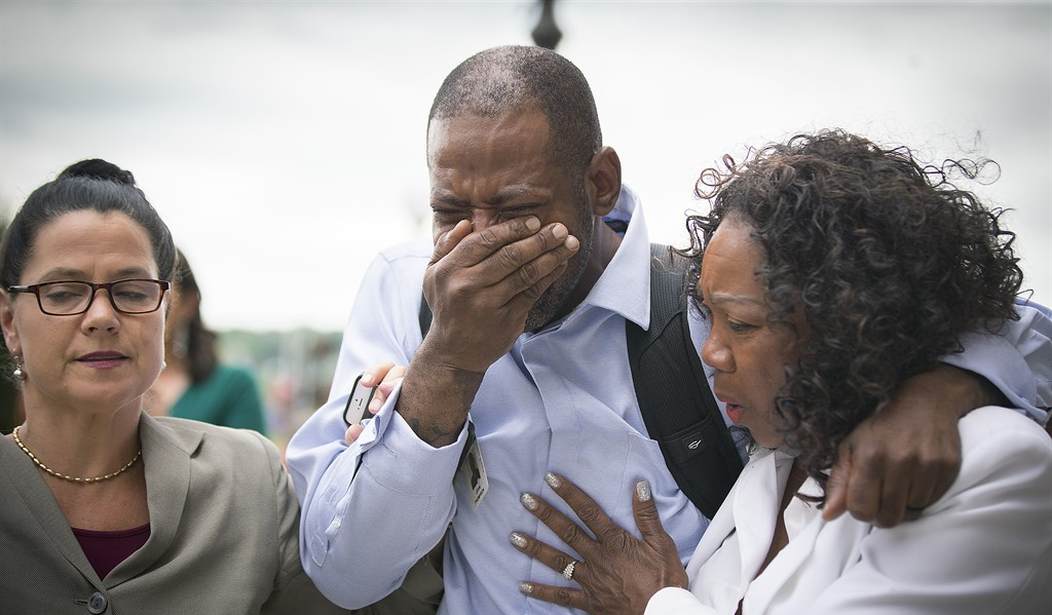An excellent point by Julian Sanchez that deserves wider exposure.
…while the conduct of the victim is held to an oddly higher standard: "Oh, he should have known NOT to keep pulling out his wallet…"
— Julian Sanchez (@normative) June 21, 2017
Which seems rather backwards. Civilians get nervous when they're stopped by police. Especially when the police are shouting!
— Julian Sanchez (@normative) June 21, 2017
Yanez, the cop, had police training and years of experience to guide him in a situation like that. Castile, the civilian, had nothing except his wits. Go watch the dashcam video and you’ll see it’s Castile who’s clearly the more nervous of the two when the encounter begins yet he behaves perfectly reasonably, volunteering to Yanez that he has a weapon. Obviously he’s trying to alert the cop to the fact that there’s a gun in the car for fear that Yanez will spot it on his own and panic. Then he tries to comply with Yanez’s command to present his license and registration and Yanez, unreasonably, panics anyway and starts pumping shots into him. To repeat a question I posed yesterday: Why would a criminal intent on killing a cop tell the cop first that he has a gun? Why didn’t Castile’s entirely reasonable behavior earn him enough of the benefit of the doubt for Yanez to at least keep his finger on the trigger instead of pulling it?
Imagine, says Sanchez, that this same confrontation had happened in the parking lot of a shooting range between two civilians. There’s a fender-bender, one guy reaches into his car for his insurance — and the other guy blows him away before seeing what he was reaching for, fearing unreasonably that he was grabbing his weapon. “Would anyone take [the shooter’s] somber pronouncement that ‘I had to make a SPLIT SECOND decision’ as anything but a pathetic rationalization?” asks Sanchez. The question answers itself. Yanez was held to a lower standard even though, thanks to his training, logically he should have been held to a higher standard.
A truth bomb via David French: Juries are perfectly willing to let cops kill unreasonably. The de facto standard applied in court isn’t reasonableness, it’s fear. So long as the cop sincerely feared he might be shot, it doesn’t matter if his fear was reasonable. That’s how Yanez, whose panic was so intense that he was still screaming in terror and horror minutes after Castile had died, ended up walking.
When I saw that palpable panic, I immediately knew why he was acquitted. The unwritten law trumped the statutes on the books. The unwritten law is simple: When an officer is afraid, he’s permitted to shoot. Juries tend to believe that proof of fear equals proof of innocence…
Legally, it’s not enough for an officer to show that he was actually afraid for his life. He has to show that “a reasonably prudent person” would also have the same fear. Clever defense lawyers twist this standard into a line of argument that goes something like this: The officer was afraid, and he can explain to you the reasons why he was afraid. Therefore, it was reasonable that he was afraid.
Reminding juries of Sanchez’s point, that the civilian also reacts under intense stress in an encounter with the police, might get them to see French’s point more clearly. Viewed in isolation, a cop will almost always get the benefit of the doubt on reasonableness because the public knows his job is dangerous and doesn’t want to tie his hands when his instinct is telling him that he needs to use lethal force to defend himself. Viewed comparatively, though, that benefit of the doubt is harder. Did Castile, the victim, behave reasonably? If so, Yanez’s intense panic and decision to shoot before determining that Castile was in fact reaching for a gun seems much less reasonable. That verdict may have turned out differently if, legally, more emphasis were placed on weighing the reasonableness of the victim’s behavior before considering the officer’s.
Failing that, you could introduce a “reasonable police officer” standard for cases involving police shootings. Do police typically blast away at drivers who happen to have a lawfully owned gun in the car with them, particularly when the driver politely informs them of that up front? That question answers itself too. By the way, as of 5 p.m. ET, still no statement from the NRA about the result in the Yanez trial. Is this a civil-rights organization or a police union? A law-abiding gun owner was killed unreasonably despite his best efforts to follow the law. How do you square the NRA’s traditional rhetoric about the Second Amendment being a crucial protection for American citizens from oppressive state force with their silence this week after a cop spazzed out and shot an innocent man to death for having a gun?








Join the conversation as a VIP Member